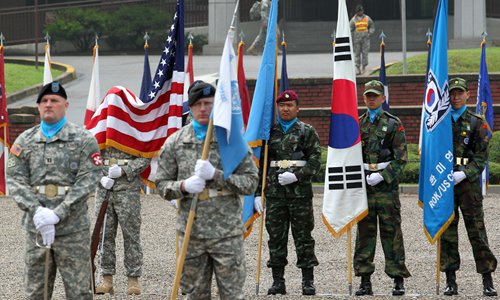HOME >> OPINION
Frictions won’t jolt US-South Korea alliance
By Dong Xiangrong Source:Global Times Published: 2019/9/8 19:28:39

Photo: IC
It was reported by South Korean media that the Blue House National Security Council decided on August 30 to push actively for an early return of the remaining 26 US military bases in South Korea. Before the Seoul Defense Dialogue kicked off on Wednesday, speculation was running high that Washington may not send a senior official to take part, though the US embassy in Seoul announced at the last minute that US Forces Korea Commander General Robert Abrams would attend the forum.
These moves between Washington and Seoul seem to suggest that the two are at odds with each other. It may be attributed to their divergences on sharing the cost of US military stationed in South Korea and Seoul's decision to scrap the General Security of Military Information Agreement (GSOMIA), a military intelligence-sharing pact with Japan. However, this will not shake the US-South Korea alliance.
The approach of US President Donald Trump to dealing with allies is different from his predecessors. Previous US presidents formed or tweaked the US alliance in terms of its allies' strategic value and global strategic deployment. Although Trump also has his global strategic considerations, his focus is on the economic calculation.
There are differences between Seoul and Washington on sharing the US Forces Korea (USFK) costs. Officials of the two countries signed a deal in February 2019, which states South Korea would raise its contribution to 1.04 trillion won ($863 million), a growth of 8.2 percent. South Korean newspaper Joongang Ilbo said Washington will seek $5 billion annual burden-sharing from Seoul. It would be tough for South Korea to bear.
Trump said at a fund-raising event on August 9, "It was easier to get a billion dollars from South Korea than to get $114.13 from a rent-controlled apartment in Brooklyn." His tone is a huge blow to the self-esteem of South Koreans, whose nationalist sentiments are strong.
US-South Korea-Japan relationship is not a complete triangular alliance. The US is an ally of both Northeast Asian countries, while South Korea doesn't have solid ties with Japan. The US intends to form stable triangular relations among the three countries, but it has not been realized so far. The US hopes all its allies, not only Japan and South Korea, in the Asia-Pacific, can have a stable and friendly relationship, contributing to a stable alliance network.
At the outset of the fresh round of Seoul-Tokyo spats, Seoul did not have many cards to deal with the economic challenges posed by Tokyo. Some economic sanctions imposed by Japan on South Korea seem to be aggressive. For example, Japan has imposed restrictions on exports of three chemicals to South Korea, which are used for the latter's pillar semiconductor industry. Japan officially removed South Korea from its "white list" on August 28, which means South Korea will no longer enjoy minimum trade restrictions on sensitive goods including electronic components.
In this context, South Korea has been divided over maintaining sharing of military intelligence with such a hostile country which has also invaded South Korea before.
President Moon Jae-in and his progressive government generally have adopted a tough attitude toward Japan. Therefore, they made a decision to scrap the GSOMIA, which was signed by South Korean conservative government of Park Geun-hye, under US influence.
The US valued the intelligence-sharing pact and constantly expressed "regret" and "disappointment" over South Korea's determination. The GSOMIA allowed information sharing among Japan, South Korea and the US in regard on North Korea's activities in the Northeast Asia. The US is dismayed about the demise of the GSOMIA, worrying the security cooperation in the region would be weakened.
South Korea's push for return of 26 USFK bases has sparked speculation of a rift between the US and South Korea. However, reducing the number of USFK bases would be the general tendency. The US has opened its largest overseas military base in Pyeongtaek, a city 35 kilometers south of Seoul, which can accommodate a considerable number of USFK. Seeking for early return of the remaining USFK bases is consistent with the relocation of US bases to Camp Humphreys in Pyeongtaek.
In US Asia-Pacific strategy, although not as important as US-Japan alliance, US-South Korea alliance is indispensable. As a pivotal anchor in US Asia-Pacific strategy, South Korea would not be abandoned by the US. Seoul-Washington alliance has still been stable, despite some frictions.
The author is a professor at the National Institute of International Strategy, Chinese Academy of Social Sciences. opinion@globaltimes.com.cn
RELATED ARTICLES:
Posted in: ASIAN REVIEW